Why Morgue Trucks Became Critical During the COVID-19 Pandemic
Morgue trucks are refrigerated trailers or vehicles used to store deceased bodies when hospitals, morgues, and funeral homes exceed their normal capacity during mass-fatality events or public health emergencies.
Key Facts About Morgue Trucks:
- Capacity: 16-50 bodies depending on trailer size (20ft vs 40ft)
- Primary Use: Surge capacity during pandemics, disasters, or mass-casualty events
- Notable Deployment: New York City used 80 FEMA-provided refrigerated trucks during COVID-19 peak
- Storage Duration: Temporary solution until permanent facilities can process remains
- Cost: Available for purchase, lease, or emergency rental through FEMA coordination
The pandemic brought morgue trucks into public view in an unprecedented way. In early April 2020, New York City reported more than 800 coronavirus deaths in a single day, with an average of 566 people dying daily during the week of April 5. The city's temporary morgue at South Brooklyn Marine Terminal held 750 bodies as of May 2021 - a stark reminder of how quickly standard morgue capacity can be overwhelmed.
Beyond New York, states like Texas, Arizona, and Oregon requested refrigerated trucks as their local facilities reached breaking points. In Nueces County, Texas, the standard morgue held just 12 bodies, while refrigerated trucks could accommodate up to 40 more. This pattern repeated across the country as the Delta variant surge tested preparedness systems again in 2021.
As American Mortuary Coolers, a Tennessee-based supplier of custom mortuary equipment, we've worked extensively with funeral homes and emergency management agencies to provide reliable refrigerated storage solutions during surge capacity events. Our experience includes helping facilities steer the complex decisions around morgue trucks, from technical specifications to operational logistics during some of the most challenging periods in recent public health history.
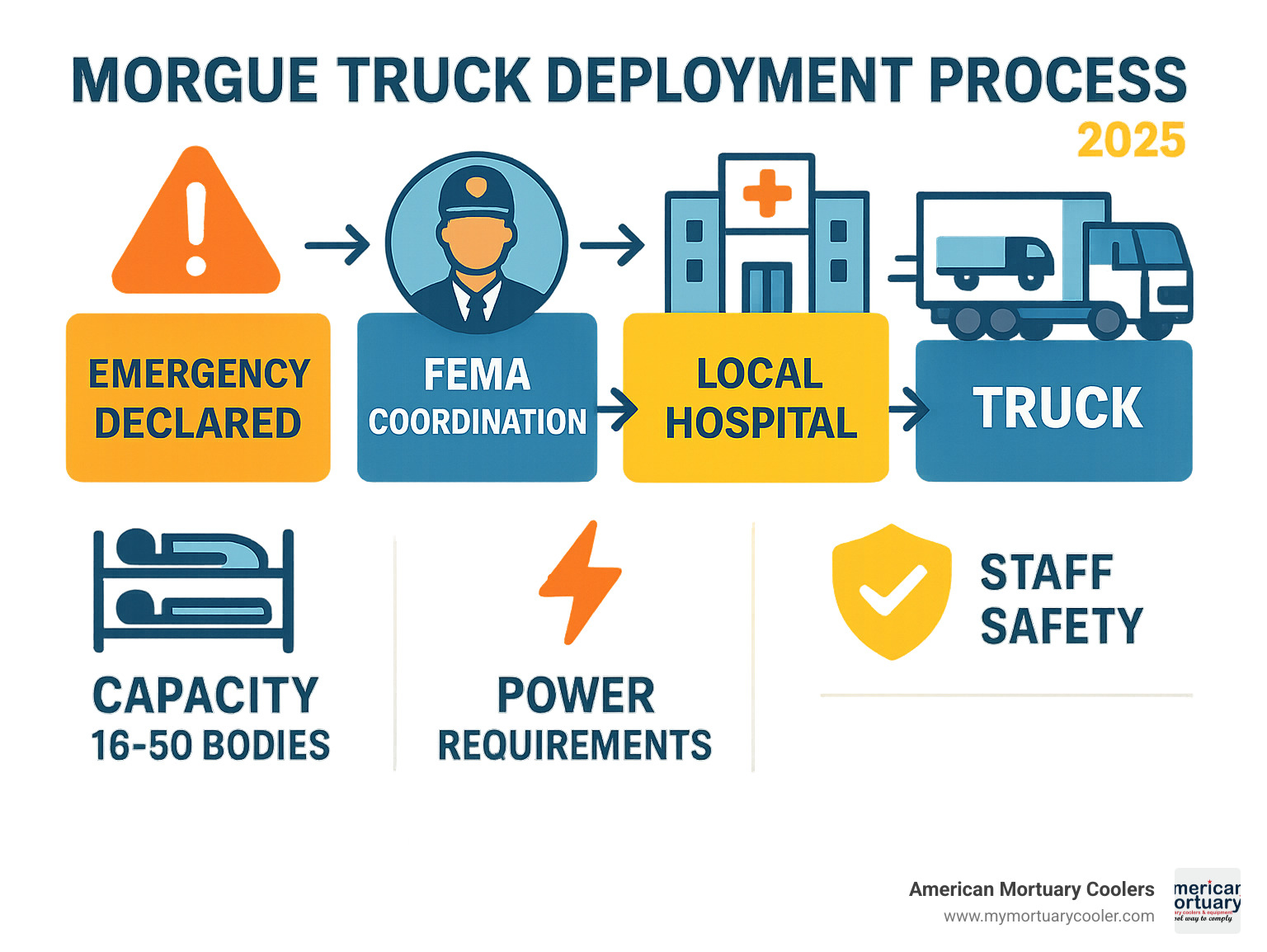
What Are Morgue Trucks?
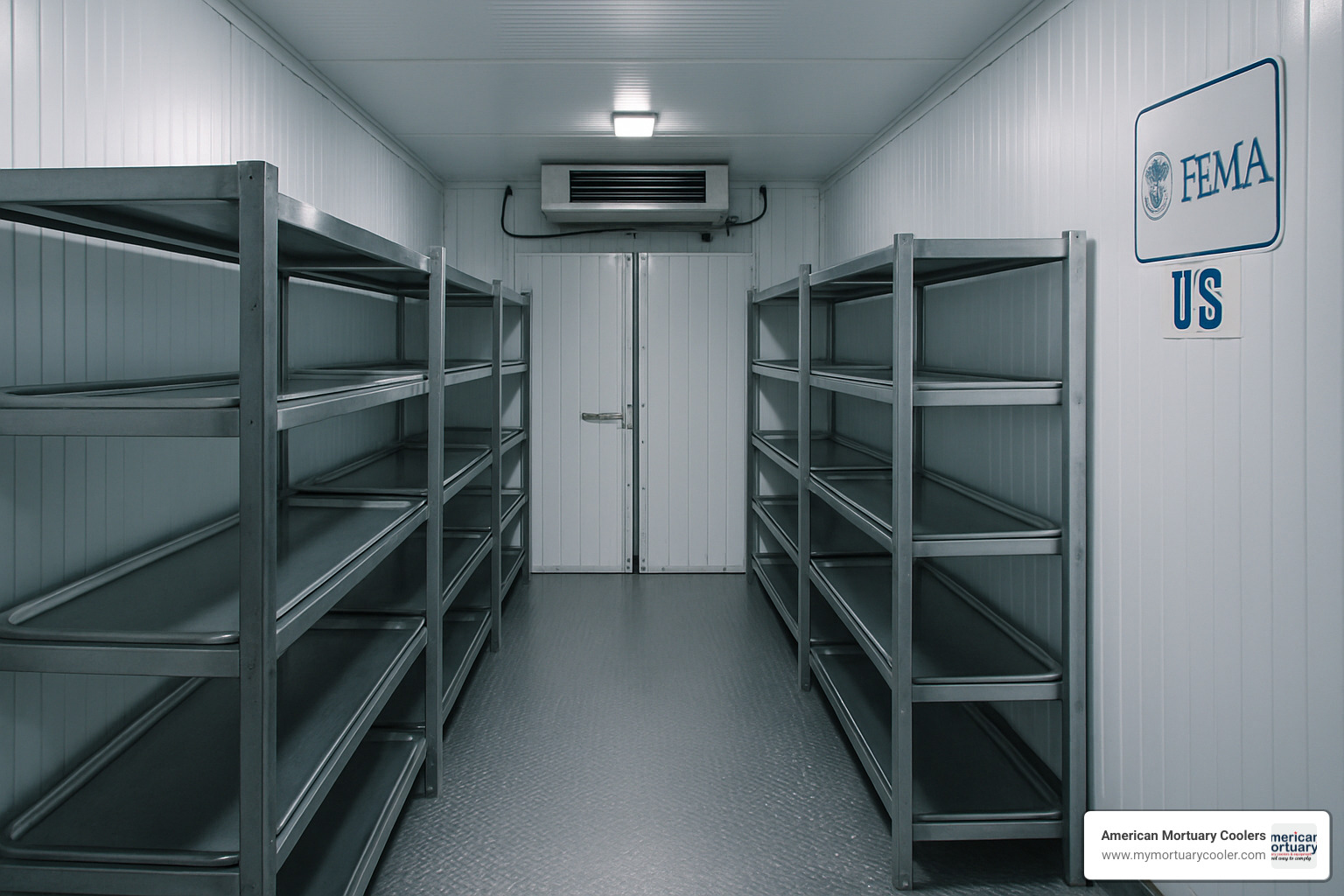
When hospitals and funeral homes run out of space during emergencies, morgue trucks step in as a crucial backup solution. These are basically refrigerated trailers that have been specially designed to store human remains safely and respectfully during crisis situations.
Think of it this way: the same technology that keeps your groceries cold during transport can be adapted to serve a much more serious purpose. Standard refrigerated trailers - what truckers call "reefers" - get transformed with specialized body racks, lifting equipment, and proper ventilation systems to create mobile morgues.
The Federal Emergency Management Agency (FEMA) keeps a supply of these units ready for emergency deployment. When communities get overwhelmed by mass casualties, FEMA can quickly send morgue trucks where they're needed most.
During COVID-19, we witnessed this system in action on an unprecedented scale. New York City alone used 45 refrigerated trucks and tents to support their overwhelmed hospitals and morgues. The last time we saw deployment at this level was after the September 11 attacks, when similar emergency storage was needed for the 2,753 victims.
More info about mobile morgue refrigeration
Why "morgue trucks" matter in mass-fatality events
The COVID-19 pandemic taught us just how quickly our normal systems can buckle under pressure. Unlike disasters such as 9/11 - which was devastating but contained to a specific time and place - the pandemic created sustained pressure for months across the entire country.
Morgue trucks became essential because hospitals need to keep beds turning over. When someone passes away, that bed needs to be available for the next patient. But if funeral homes are full and can't accept new bodies, the whole system gets backed up fast.
As one Texas health official put it during the 2020 surge: "hospitals and funeral homes are out of space, and beds must be turned over quickly when someone dies." This created a domino effect that rippled through entire communities.
COVID-19 also brought unique challenges we hadn't faced before. The infectious nature of the disease meant many funeral homes initially refused to accept COVID-positive bodies. This put even more strain on hospital morgues and made morgue trucks an absolutely critical part of the public health response.
Typical design & capacity of morgue trucks
Most morgue trucks start life as standard 20-foot or 40-foot refrigerated trailers. The smaller 20-foot units typically hold 16 bodies, while the larger 40-foot versions can accommodate up to 35 bodies when equipped with double-deck storage systems.
The magic happens in how these trailers get outfitted. Double-deck racks create upper and lower storage levels to maximize space. Removable aluminum trays make loading and unloading easier on staff. Battery-powered lifts or manual systems help move bodies safely, reducing injury risk for workers.
Proper ventilation ensures consistent temperatures throughout the unit, while organized shelving systems with secure fastening points keep everything in place during transport.
| Feature | Truck-Based | Container-Based |
|---|---|---|
| Mobility | High - can be relocated easily | Low - requires crane for moving |
| Capacity | 16-40 bodies | 16-35 bodies |
| Setup Time | 1-2 hours | 4-6 hours |
| Power Source | Truck engine or external | External power required |
| Cost | Higher (includes truck) | Lower (container only) |
The choice between truck-based and container-based systems often comes down to mobility needs and budget constraints. Truck-based units can be moved quickly as situations change, while container systems offer a more cost-effective solution when you know the location won't change.
History & U.S. Deployment of Morgue Trucks
The widespread use of morgue trucks during COVID-19 wasn't completely new to America, but nothing had prepared us for the scale we witnessed. While temporary morgue solutions had been used before - most notably after 9/11 - the pandemic brought a sustained, nationwide demand that stretched for months rather than weeks.
It all started in March 2020 in Brooklyn, where Wyckoff Heights Medical Center became the first hospital to set up a refrigerated trailer in its parking lot. What began as one hospital's desperate solution quickly became a symbol of the crisis unfolding across America.
New York City bore the brunt of those early weeks. By April 2020, the city was reporting over 776 deaths in a single day - more than a quarter of all U.S. COVID deaths at that time. The images of morgue trucks lined up outside hospitals became seared into our collective memory. Workers in protective gear moved bodies in what witnesses described as an almost assembly-line process, a scene that felt surreal even as it was happening.
The city's response was massive. Beyond the immediate truck deployments, officials established a long-term storage facility at the South Brooklyn Marine Terminal. The constant hum of refrigeration units outside apartment windows became a haunting soundtrack to the pandemic for many New Yorkers.
First appearances of morgue trucks during COVID-19
Those first morgue trucks outside Brooklyn hospitals in March 2020 marked a turning point in how Americans understood the severity of COVID-19. The visual impact was immediate and powerful - these weren't just statistics anymore, but a stark reminder that our healthcare system was being pushed to its breaking point.
FEMA responded quickly, ultimately delivering 80 refrigerated trucks to New York City during the peak crisis. This represented the largest peacetime deployment of emergency morgue capacity in our nation's history. The trucks appeared at hospitals throughout all five boroughs, with some facilities needing multiple units as their regular morgue capacity was exceeded by 300-400%.
The emotional toll on communities was profound. As one resident told ProPublica, "We hear the hum of the refrigerator going all night long." That constant reminder outside people's windows became more than just a public health measure - it was a wake-up call that helped drive home the urgent need for masks, distancing, and other protective measures.
States & cities that relied on morgue trucks
What happened in New York was just the beginning. Morgue trucks soon became essential resources across the country as different regions faced their own surges. Texas saw major deployments in both 2020 and again during the Delta variant surge in 2021. San Antonio, Phoenix, and Jacksonville all requested federal assistance as their local morgues reached capacity.
The situation in rural areas was particularly challenging. Oregon's experience showed how quickly small communities could be overwhelmed. Tillamook County's only funeral home could handle nine bodies, but during one August 2021 surge, the county more than doubled its COVID death toll in just one week.
Josephine County, Oregon, painted an even starker picture. With a vaccination rate of just 53%, the county found its hospital and five funeral homes at "the edge of crisis capacity daily." They requested a refrigerated trailer capable of holding 20-48 bodies - a sobering reminder of how the pandemic affected every corner of America, not just major cities.
The state's emergency management office described their role as being like "air traffic control," matching desperate requests for refrigerated storage with available units. It was a coordination effort that continued throughout 2021 as different variants created new waves of demand. Research on pandemic overflow documented similar challenges in cities across the country.
Refrigerated Trucks as Morgues: A Chilling Look at Emergency Solutions
Choosing the Right Morgue Truck: Specs, Leasing & Budget
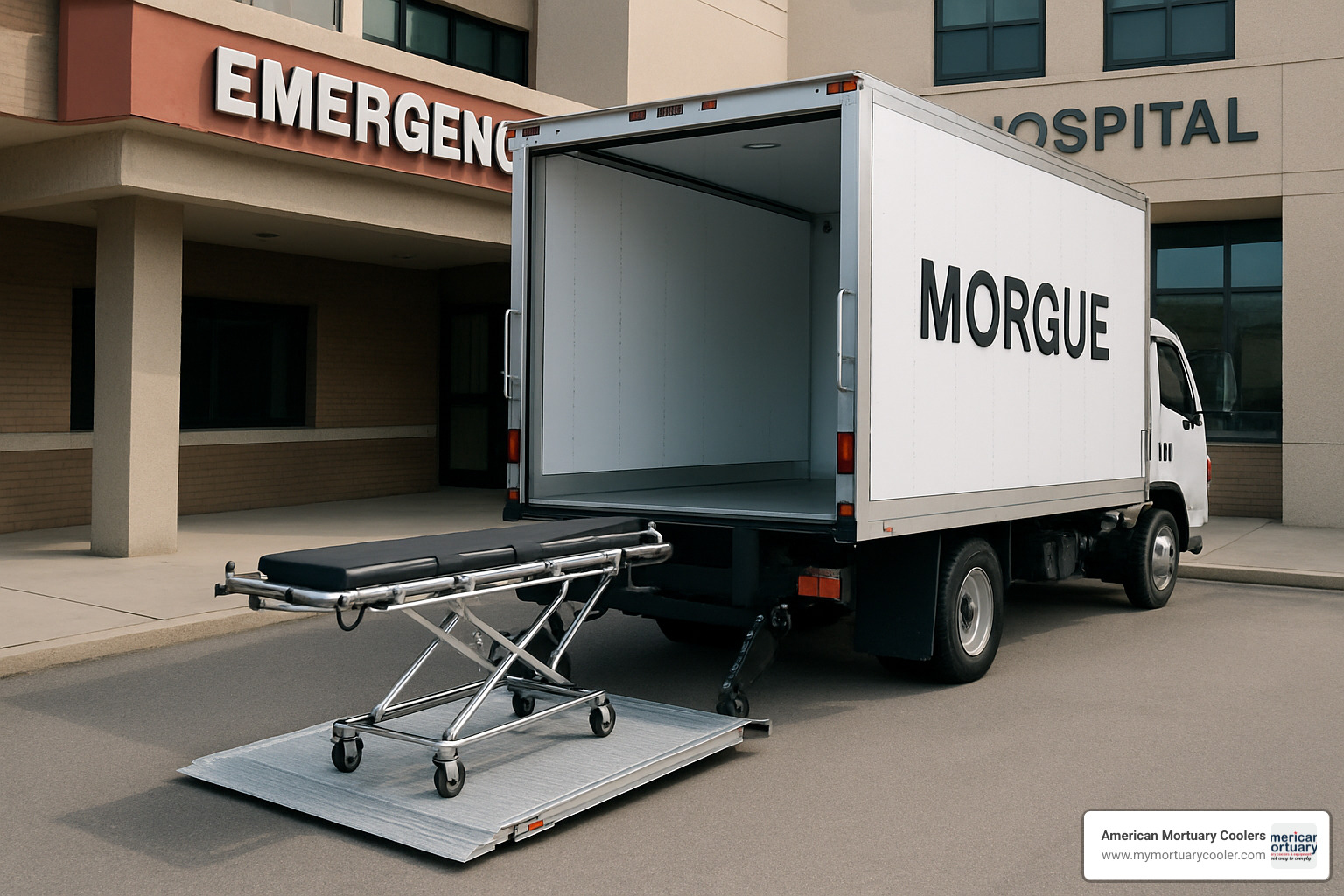
Selecting the right morgue trucks for your facility feels overwhelming when you're facing an emergency, which is exactly why we encourage planning ahead. Over our years working with funeral homes and medical facilities, we've learned that the facilities with the best outcomes are those who think through their needs before crisis hits.
The difference between a well-chosen morgue truck and a hastily arranged one can mean the difference between smooth operations and daily headaches for your staff. We've seen facilities struggle with units that looked good on paper but created real problems in practice - from refrigeration systems that couldn't handle summer heat to loading systems that put staff at risk for injury.
Budget planning varies dramatically depending on whether you're preparing for potential future needs or responding to an active emergency. Morgue trucks purchased outright might qualify for Section 179 tax deductions, while FEMA reimbursement can help with emergency rentals - though the paperwork process requires patience and detailed documentation.
Ultimate Guide: Refrigerated Truck Lease
Key technical features to evaluate
The refrigeration system deserves your closest attention when evaluating morgue trucks. We typically recommend Thermo King units because they've proven reliable even during Texas summers and Minnesota winters. But the refrigeration unit is only as good as the insulation supporting it - poor insulation means your system works harder, costs more to operate, and risks temperature fluctuations.
Body handling equipment separates functional morgue trucks from units that create safety nightmares. Hydraulic hoists eliminate the back injuries that come from manual lifting, while double-deck shelving systems maximize your capacity without sacrificing organization. Battery-powered lifts provide crucial backup when external power fails, which happens more often than you'd expect during emergencies.
Power planning often gets overlooked until it becomes a problem. These refrigeration units draw significant electricity, and generator backup systems need enough capacity to run continuously for at least 72 hours. We've seen facilities caught off-guard when their backup power couldn't handle the load during extended outages.
Ownership vs. rental decisions
The math on morgue trucks changes dramatically based on how long you need them. Emergency rentals during active crises can cost $200-500 per day, while longer-term arrangements often drop to $50-150 daily. If you're looking at purchase, fully equipped units typically run $150,000-300,000 depending on size and features.
FEMA reimbursement can cover up to 75% of eligible costs during declared emergencies, but the application process takes patience and detailed record-keeping. We've guided many facilities through this process and always recommend working with vendors who understand FEMA requirements and can provide proper documentation from day one.
Lease terms offer flexibility for facilities that need occasional surge capacity without ongoing maintenance responsibilities. The best agreements include rapid deployment clauses guaranteeing delivery within 24-48 hours, maintenance coverage for refrigeration repairs, and training provision to ensure your staff knows how to operate everything safely.
In-Depth Guide to Reefer Trailers: Understanding the Basics
Operational, Ethical & Emotional Considerations
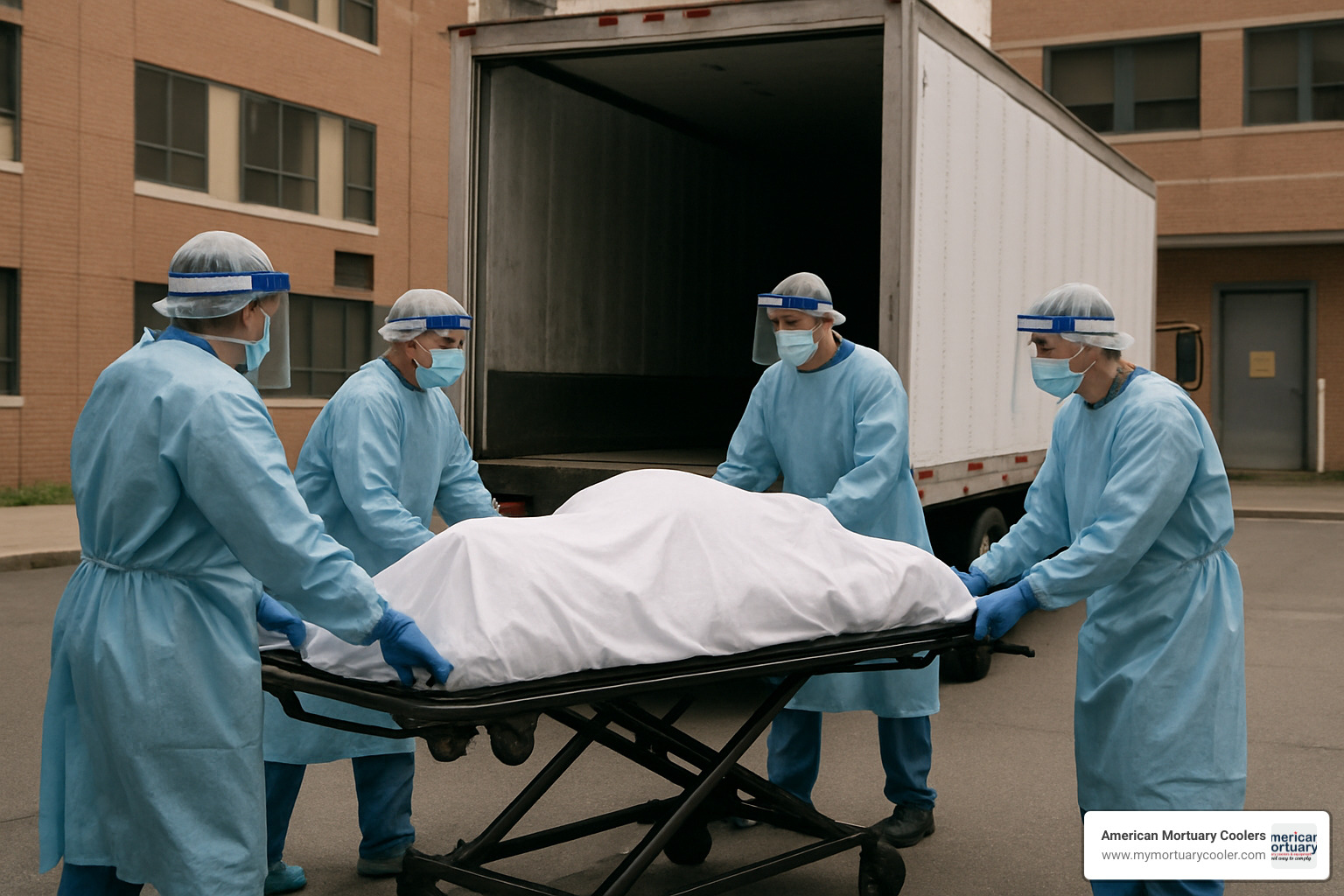
When we talk about morgue trucks, it's easy to focus on the technical specs and forget about the human side of the equation. But the reality is that these mobile units create challenges that go way beyond keeping bodies cold. We've worked with facilities across the country, and we've seen how the emotional weight of deploying morgue trucks affects everyone involved - from the staff who work with them daily to the families and communities who see them as stark reminders of loss.
The sight of refrigerated trailers parked outside hospitals became one of the most haunting images of the pandemic. These weren't just storage solutions - they became symbols of how overwhelmed our healthcare system had become. Managing that visual impact while maintaining operational efficiency requires a delicate balance of transparency, sensitivity, and practical planning.
OSHA protocols become even more critical when you're working in the confined, cold environment of a morgue truck. Staff need proper PPE training, bloodborne pathogen protocols, and ergonomic lifting techniques. The cramped quarters make everything more challenging, from moving bodies safely to maintaining proper infection control procedures.
Cultural and religious considerations add another layer of complexity that many facilities don't anticipate. Different faith traditions have specific requirements for how bodies should be handled, positioned, or prepared. The temporary nature of morgue truck storage can sometimes conflict with these customs, creating additional stress for grieving families during an already difficult time.
Logistical challenges for staff working in morgue trucks
Working inside morgue trucks is physically demanding in ways that many people don't expect. The cold environment makes everything harder - your hands get stiff, equipment becomes slippery, and the confined space means you're constantly bending and maneuvering in awkward positions. We've seen a significant increase in lifting injuries when facilities don't provide proper mechanical lifting assistance or adequate staff training.
Power backup is absolutely critical, but it's often the thing that gets overlooked until disaster strikes. During Hurricane Ida, several facilities lost power for days, and their morgue trucks became unusable because they didn't have generator backup. We now recommend dual-redundant power systems for any critical deployment - it's not overkill when you're dealing with something this important.
Tracking and inventory management becomes a whole different challenge with temporary storage. Bodies stored in morgue trucks must be carefully logged and tracked to ensure proper identification and family notification. Unlike permanent morgue facilities with established systems, mobile units require extra attention to maintain accurate records and prevent mix-ups.
Temperature monitoring requires constant vigilance. Fixed morgue facilities typically have automated alarm systems that alert staff to any temperature fluctuations. With morgue trucks, you're often relying on manual checks or basic alert systems. Staff need to be trained to recognize signs of refrigeration failure and have clear contingency plans when equipment malfunctions.
Community perception & ethical handling of the deceased
The presence of morgue trucks in a community sends a message that's impossible to ignore. As one emergency director put it during the pandemic, "It is a hard thing to talk about – people's loved ones are dying." The key is managing public communication with both honesty and sensitivity.
We've learned that proactive communication works much better than trying to explain things after the fact. When Baptist Health in Florida deployed a mobile morgue trailer, they emphasized that "proactive planning should neither cause alarm nor speculation." This approach helps communities understand that preparation is responsible planning, not a sign that disaster is imminent.
Respectful storage protocols aren't just about following regulations - they're about maintaining public trust and honoring the dignity of every person who has died. This means proper body handling procedures, secure storage systems, and clear protocols for family access and notification. The temporary nature of morgue truck storage should never compromise how we treat people's loved ones.
Religious and cultural customs require flexibility and understanding. Some faith traditions have specific requirements for body positioning, strict time limits for burial, or particular handling protocols. We work with facilities to develop procedures that can accommodate these requirements while maintaining public health safety. It's about finding ways to honor people's beliefs even in the most challenging circumstances.
Freezer Trucks as Morgues: A Temporary Solution or Permanent Problem?
Frequently Asked Questions about Morgue Trucks
How many bodies can a single morgue truck store safely?
The storage capacity of morgue trucks depends on several factors, but most facilities can expect to accommodate between 16 and 50 bodies depending on the trailer size and interior setup. A standard 20-foot refrigerated trailer typically holds 16 bodies when properly configured, while larger 40-foot units can store up to 35-50 bodies with double-deck storage systems.
We've seen real-world examples that illustrate this capacity expansion clearly. In Nueces County, Texas, their standard morgue building could handle just 12 bodies, but adding refrigerated trucks increased their capacity by up to 40 additional bodies. That's more than tripling their storage capability during the COVID-19 surge.
The practical capacity can vary based on the size of the deceased and the specific equipment installed inside the trailer. Double-deck rack systems maximize space efficiency, but facilities need to balance capacity with safe handling procedures for their staff. It's better to have slightly lower capacity with proper lifting equipment than to risk worker injuries trying to maximize every available space.
Are morgue trucks still on standby in 2024 surges?
Absolutely. The COVID-19 pandemic taught emergency planners valuable lessons about surge capacity, and many jurisdictions now maintain morgue trucks on standby or have pre-arranged contracts for rapid deployment. The infrastructure that was built during the pandemic hasn't disappeared - it's been integrated into ongoing preparedness planning.
FEMA continues to maintain a strategic reserve of refrigerated morgue trucks and containers specifically for emergency deployment. State emergency management offices have also developed much more sophisticated mutual aid agreements that allow jurisdictions to share resources quickly during surge events.
Oregon's approach provides a good example of how this works in practice. Their emergency management office now functions like "air traffic control" to match resource requests with available refrigerated units across the state. This coordinated approach means smaller counties like Tillamook or Josephine don't have to face capacity crises alone.
Many hospitals and funeral homes have also invested in their own surge capacity equipment or established lease agreements that can be activated quickly. The goal is to avoid the desperate scrambling we saw in March and April 2020 when facilities were overwhelmed within days.
What regulations govern refrigerated morgue trucks on U.S. roads?
Morgue trucks operate under a complex web of regulations that vary depending on whether they're being transported, parked temporarily, or operating as stationary morgue facilities. When these units are moving on public roads, they must comply with all Department of Transportation regulations for commercial vehicles, including proper driver licensing and vehicle safety standards.
For stationary deployment, the regulatory picture becomes more complex. Most local health departments have specific requirements for temporary morgue facilities, including proper ventilation, temperature monitoring, and waste management protocols. Many jurisdictions require permits for temporary morgue operations and have detailed requirements about where these units can be placed and how they must operate.
The infectious disease aspect adds another regulatory layer. During COVID-19, many states developed specific protocols for handling potentially infectious remains, which affected how morgue trucks could be used and what safety equipment was required for staff.
We always recommend working with local emergency management offices and health departments early in the planning process. They can help steer the regulatory requirements and often have pre-approved protocols that streamline deployment during actual emergencies. It's much easier to handle the paperwork before you're in crisis mode.
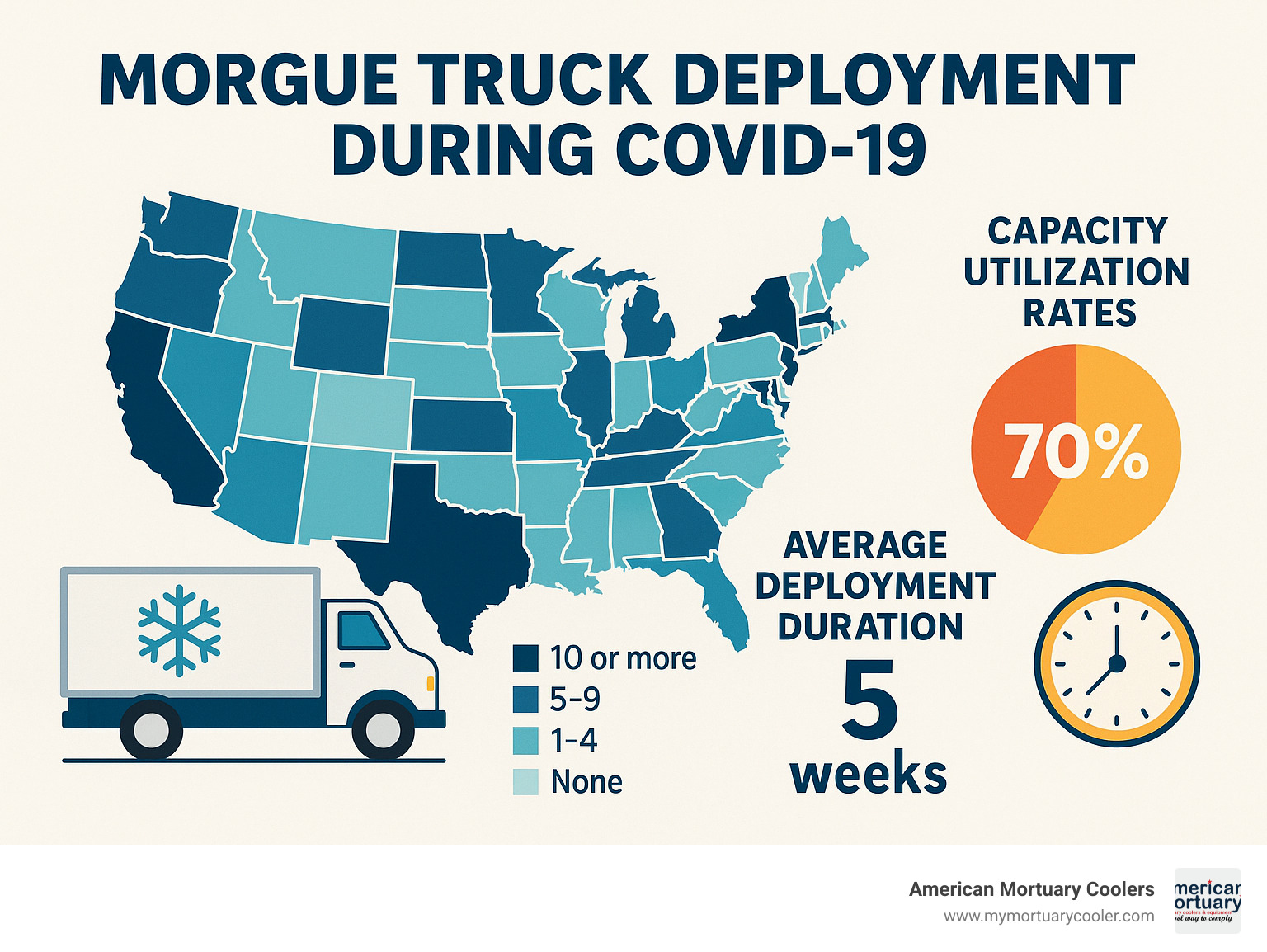
Conclusion
The COVID-19 pandemic taught us lessons we never expected to learn. Morgue trucks went from being rarely-seen emergency tools to becoming symbols of our most challenging public health crisis. When hospitals in New York started parking refrigerated trailers outside their doors, it became clear that traditional planning wasn't enough.
What we learned from those difficult months has made us better prepared for whatever comes next. The deployments in New York, Texas, Oregon, and dozens of other communities showed us both what works and what doesn't when surge capacity is needed quickly.
At American Mortuary Coolers, we've been part of this learning process. Our Tennessee-based team has worked with facilities across the country to understand what they really need when standard capacity isn't enough. We've seen how the right equipment, properly deployed, can help communities maintain dignity and respect even during their most overwhelming moments.
The morgue trucks that seemed like temporary fixes during the pandemic are now becoming permanent parts of emergency preparedness plans. States are keeping equipment on standby. Hospitals are developing better protocols. Funeral homes are thinking differently about surge capacity. What started as crisis response has evolved into thoughtful preparation.
We're also seeing improvements in the equipment itself. The lessons learned from those early deployments - about power systems, staff safety, family communication, and community sensitivity - are being built into better solutions. Our custom designs now reflect real-world experience from facilities that have actually used these systems under pressure.
The future will likely bring new challenges we can't predict today. But we're more ready than we were in March 2020. The morgue trucks that helped us through the pandemic have become part of a stronger, more resilient system that can respond with both practical capacity and human compassion.
Every family deserves to have their loved ones treated with dignity, even during the most difficult circumstances. That's the standard we keep in mind as we continue developing better solutions for the challenges ahead.



















